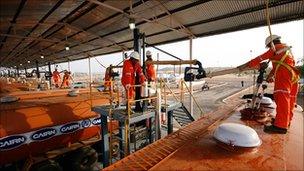Cairn Energy refuse to publish full oil spill plan
- Published

Cairn Energy is looking to develop oil fields in the Arctic off Greenland
The Scots-based energy firm involved in oil exploration in the Arctic has refused to publish full details of its contingency plan should a spill occur.
Cairn Energy, based in Edinburgh, is at the forefront of the push to open up oil supplies off Greenland.
The company and the Greenland government told a BBC Scotland investigation team the plan was secret to prevent sabotage by "third parties".
The lack of transparency has prompted concern from environmental groups.
Some estimates have suggested that the Arctic region could contain up to a quarter of the world's remaining oil reserves.
Cairn is due to resume its operations in the region next spring after spending the summer carrying out exploration work.
Dr Martin Preston, a marine pollution expert at the University of Liverpool, said the plans that were currently in the public domain gave little detail about how Cairn would deal with a spill.
'Direct action'
He said: "I think they are making comments about using really rather standard techniques which are employed elsewhere and I'm not sure they've really taken on board some of the risks that are associated with this high latitude work. And that worries me."
In August, protesters from environmental group Greenpeace tried to stall the exploration work by occupying Cairn Energy' s Alpha rig.
The protest ended in September following the arrest of four activists.
Greenpeace spokesman Ben Ayliffe said it was ludicrous to infer his organisation could sabotage any attempt to clean up a future oil spill.
He said: "Greenpeace have been out in Greenland taking peaceful direct action to stop companies like Cairn drilling in the first place.
"It is completely absurd to suggest and completely wrong to suggest that Greenpeace would somehow stop Cairn from actually trying to stop a well leaking if that ever happened."
Cairn Energy has insisted they have filed a detailed spill plan with the government of Greenland.
During drilling operations, the company said they had two rigs working together, which allowed them to drill a relief well in case of any blow-out, as well as a fleet of support vessels.
Simon Thomson told the BBC his firm was focused on safety.
He said: "Everything that we have done, we have done in conjunction with the authorities and they quite rightly have a challenging regime, so they've adopted Norwegian North Sea standards which are kind of the toughest in the world."
Mr Thomson said there had also been "third party reviews" of the company's safety plans.
He added: "So, yes, we are very confident that we have got a robust drilling programme."
Jon Skov Neilsen, head of Greenland's bureau of minerals and petroleum, added: "It's more important that the response plans work and are efficient than having everyone know phone numbers and where exactly the equipment is situated and so on.
"That's our view anyway. That's the choice we've made and we think it's the right choice."
- Published26 October 2010
- Published21 September 2010
- Published2 September 2010